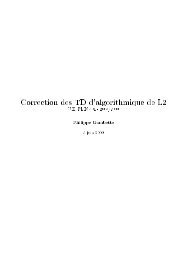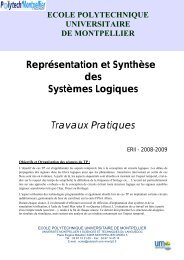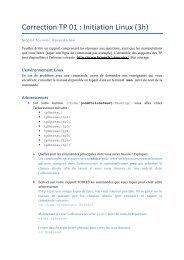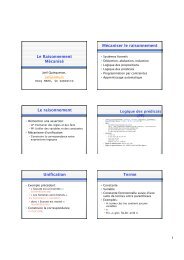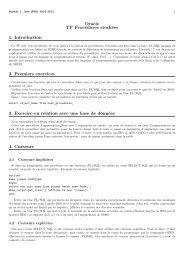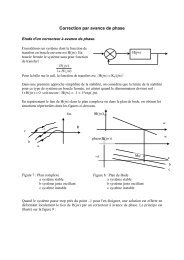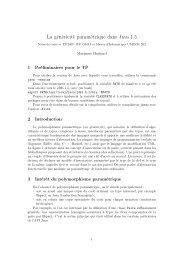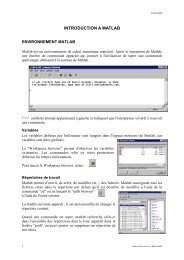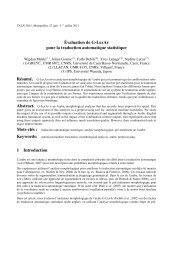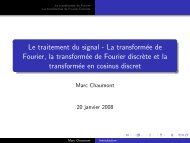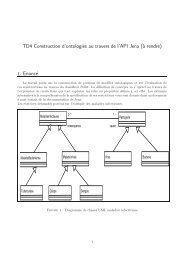Evaluating User Experience in Games: Concepts and Methods - Lirmm
Evaluating User Experience in Games: Concepts and Methods - Lirmm
Evaluating User Experience in Games: Concepts and Methods - Lirmm
Create successful ePaper yourself
Turn your PDF publications into a flip-book with our unique Google optimized e-Paper software.
4 Assess<strong>in</strong>g the Core Elements of the Gam<strong>in</strong>g <strong>Experience</strong> 49<br />
4.1.3 Overview of the Chapter<br />
We divided the chapter <strong>in</strong>to six sections. First, we present a def<strong>in</strong>ition for user experience<br />
<strong>and</strong> then we look at how user experience relates to the experience of play<strong>in</strong>g<br />
video-games. We proceed by present<strong>in</strong>g a qualitative study for identify<strong>in</strong>g a theory<br />
for the gam<strong>in</strong>g experience. We then present a model <strong>and</strong> a questionnaire, which is<br />
<strong>in</strong>cluded <strong>in</strong> the Appendix, based on the theory. Then the theory is used <strong>in</strong> an example<br />
to differentiate among two different gam<strong>in</strong>g experiences. F<strong>in</strong>ally, we present<br />
conclud<strong>in</strong>g comments.<br />
4.2 The Concept of <strong>User</strong> <strong>Experience</strong><br />
As we have discussed above, def<strong>in</strong><strong>in</strong>g <strong>and</strong> underst<strong>and</strong><strong>in</strong>g the concept of <strong>User</strong><br />
<strong>Experience</strong> as only personal or subjective seem to be <strong>in</strong>sufficient for provid<strong>in</strong>g a<br />
scientific approach. In this section, we present a def<strong>in</strong>ition of user experience that<br />
helps <strong>in</strong> br<strong>in</strong>g<strong>in</strong>g the concept of user experience towards an objective underst<strong>and</strong><strong>in</strong>g.<br />
The discussion is grounded <strong>in</strong> different concepts about user experience, from<br />
the colloquial use to the different uses with<strong>in</strong> Human Computer Interaction <strong>and</strong><br />
philosophy.<br />
4.2.1 Underst<strong>and</strong><strong>in</strong>g <strong>Experience</strong><br />
In our everyday life, we usually do not need further explanation when talk<strong>in</strong>g about<br />
experiences. In the Merriam-Webster’s Collegiate Dictionary (<strong>Experience</strong> 2009),<br />
experience is def<strong>in</strong>ed as someth<strong>in</strong>g <strong>in</strong>tr<strong>in</strong>sic to human life. Every activity that a<br />
human performs constitutes <strong>and</strong> produces an experience; it is both constituent <strong>and</strong><br />
product. <strong>Experience</strong> is the result of the <strong>in</strong>dividual <strong>in</strong>teract<strong>in</strong>g with the environment<br />
(Dewey 1938). In Human Computer Interaction (HCI), the term design<strong>in</strong>g for experience<br />
is about consider<strong>in</strong>g the user, the task <strong>and</strong> the context when design<strong>in</strong>g a<br />
computer application (Buxton 2007). But as experience is part of the human everyday<br />
life, evaluat<strong>in</strong>g experience is not as clear-cut as design<strong>in</strong>g for experience appears<br />
to be. <strong>Experience</strong> is def<strong>in</strong>ed as personal <strong>and</strong> subjective, so evaluat<strong>in</strong>g experience is<br />
about evaluat<strong>in</strong>g a subjective appreciation of the user.<br />
<strong>Evaluat<strong>in</strong>g</strong> experience places the emphasis on go<strong>in</strong>g beyond usability by look<strong>in</strong>g<br />
at the relation between the user <strong>and</strong> the task. Usability is how an application<br />
is implemented to let the user perform a task effectively <strong>and</strong> efficiently; the ma<strong>in</strong><br />
focus is productivity, to let the user do the tasks with good quality at an optimal<br />
time. Secondary goals are user preference <strong>and</strong> satisfaction (Bevan 1995). It is the<br />
evaluation of this relationship between the user with task <strong>and</strong> context mediated by<br />
the application (Beaudou<strong>in</strong>-Lafon 2004). Preece et al. (2002) def<strong>in</strong>e experience as<br />
how the <strong>in</strong>teraction feels to the users; an application taps <strong>in</strong>to experience, when dur<strong>in</strong>g<br />
the <strong>in</strong>teraction process, factors such as fun, enjoyment, pleasure or aesthetics




